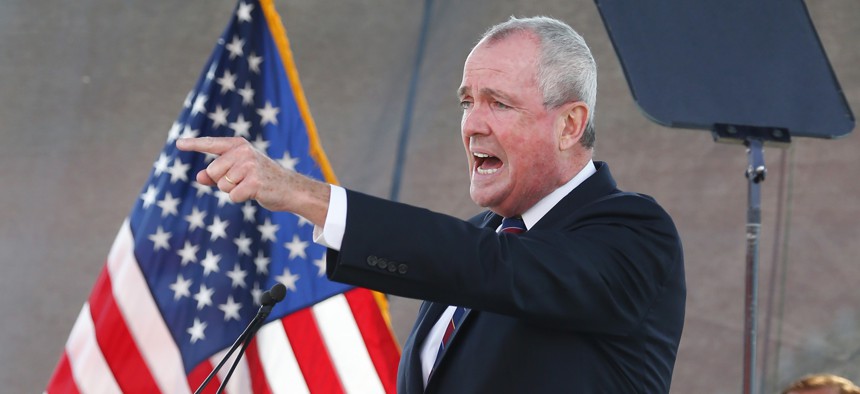In New Jersey, a Proposal for $1,000 ‘Baby Bonds’

New Jersey Gov. Phil Murphy speaks during his 2021 budget address at SHI Stadium at Rutgers University, Tuesday, Aug. 25, 2020, in Piscataway, NJ. AP Photo/Noah K. Murray
Gov. Phil Murphy, who proposed the program on Tuesday, said it would be the first statewide initiative of its kind. But the added spending would come at a time when the state’s budget is strained.
Thousands of children born this year in New Jersey would be eligible for a $1,000 deposit from the state under a plan that Gov. Phil Murphy announced on Tuesday, aiming to help the state’s youngest residents build a nest egg that they can use for costs like college tuition.
The Democratic governor included the “baby bond” program in a revised fiscal 2021 budget proposal and said that it would be the first statewide initiative of its kind if enacted.
Baby bonds are not a new idea. Murphy said his plan is inspired by a similar proposal that one of New Jersey's U.S. senators, Cory Booker, has been pushing in Congress. When Hillary Clinton was running for president back in 2007, she proposed a $5,000 baby bond account.
Proponents say the bonds provide one way to help address the yawning wealth gap between Americans at the high and low ends on the income ladder, a divide where Black Americans tend to fare far worse than white families.
Murphy’s office estimates that about 72,000 babies—or roughly three of four—born in the state this year will be eligible for the money. In order to qualify, a family’s annual income must be less than 500% of the federal poverty level, currently $131,000 for a family of four.
Residents who receive one of the bonds when they’re born would be able to access it with any accrued interest earnings when they turn 18.
“As this child grows, so, too, will the value of this bond—to help pay for college, to help make a down payment on a home, or to help start a small business,” Murphy said.
The program would need approval from the state legislature to go into effect. Democrats hold wide majorities in both chambers.
But the baby bond proposal—which could cost upwards of $72 million in its first year, if the estimate of 72,000 eligible children is correct—comes at a time when the state has been scrambling to repair damage to its budget from the coronavirus-driven economic crash.
The state Supreme Court recently cleared the way for the state government to borrow up to nearly $10 billion to help fix the shortfall—a plan backed by Murphy, but strongly opposed by Republicans.
On Tuesday, Republican lawmakers lashed out against the governor’s revised budget proposal.
“With the state credit card in his pocket, Governor Murphy’s budget plan shows none of the fiscal restraint that virtually every family and small business has been forced to exercise due to the coronavirus," GOP state Sen. Declan O’Scanlon said in a statement.
“He wants to borrow billions, which will compound to billions more in interest and fees, to support a budget that demonstrates not one shred of creative cost-cutting reform,” he added.
New Jersey’s general fund spending has been in the $33 billion to $37 billion range in recent years. Murphy says his proposal would reduce state spending by about $1.25 billion, but that it would preserve core programs like state aid to K-12 schools and municipalities.
It also renews the governor’s call for a “millionaire’s tax” on income over $1 million, along with other tax policies he described as progressive, such as extending a 2.5% corporate tax surcharge, restoring a sales tax on limousines and removing a tax cap on boats.
Murphy said that under his proposal the state would also stay the course with a payment to its pension system that was announced in February, with that cost totaling nearly $4.9 billion.
Bill Lucia is a senior reporter for Route Fifty and is based in Olympia, Washington.
NEXT STORY: Pennsylvania Governor Suggests Selling Marijuana Through State-Run Stores






